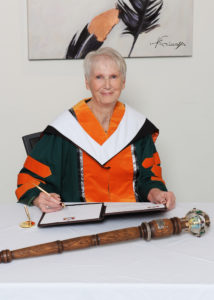Eunice Harker
 Cape Breton University is delighted to honour and recognize the outstanding work and dedication to the advocacy of human rights of Eunice Harker.
Cape Breton University is delighted to honour and recognize the outstanding work and dedication to the advocacy of human rights of Eunice Harker.
Born in Scotland, Eunice Harker’s career and advocacy work in Canada began after her teacher training in England. Eunice then studied at Carleton University, where she also worked on human and trade-unions rights for the Canadian Teachers’ Federation and two public sector unions.
From 1980 to 1988, Eunice worked on international human rights issues as a senior staffer with Amnesty International. In this capacity, she played a leading role in the organization’s efforts on trade-union rights and fostered the involvement of professional organizations and unions in Canada in defending freedom of expression and political opinion worldwide.
From 1989 to 2004, she served with distinction as a member of Canada’s Immigration and Refugee Board, in the Refugee Protection Division. There, Eunice demonstrated a deep understanding of procedural fairness and natural justice in the conduct of major administrative tribunal.
Eunice also played a role as part of the Working Group on Women Refugee Claimants, which developed guidelines for protecting people from gender-based persecution.
Over the course of her career, Eunice has been asked to preside on numerous high-profile public cases. Through this work, she has earned the respect of the legal profession dedicated to immigration and refugee issues and for her integrity and interpretation of refugee law.
Eunice is, of course, no stranger to Cape Breton University and the Cape Breton community. During her ten-year residence in Cape Breton, she was active in many community organizations and outreach initiatives, such as the Association for Safer Cape Breton Communities, where she was a founding member.
She chaired the executive board of Howard House for six years and served as the Provincial Representative on the Board of Police Commissioners for the Cape Breton Regional Municipality. Her role on the Board of Police Commissioners was celebrated with her being awarded the Queen’s Diamond Jubilee Medal in 2012.
2017 marks the 50th anniversary of the Nova Scotia Human Rights Commission (NSHRC), which has emerged as a leader among Canada’s statutory human rights bodies for timely resolution of complaints and on-line training for businesses. Eunice Harker, an outstanding human rights advocate, is the current Chair of the NSHRC.
Eunice was first appointed to the Board of NSHRC in 2005 and became Chair in 2011. Under Eunice’s leadership, the NSHRC has made important strides in promoting human rights throughout the province, especially among the African Nova Scotian and First Nations communities. Most recently, Eunice is involved in initiatives for using restorative principles for resolving conflict on Nova Scotia’s South Shore.
